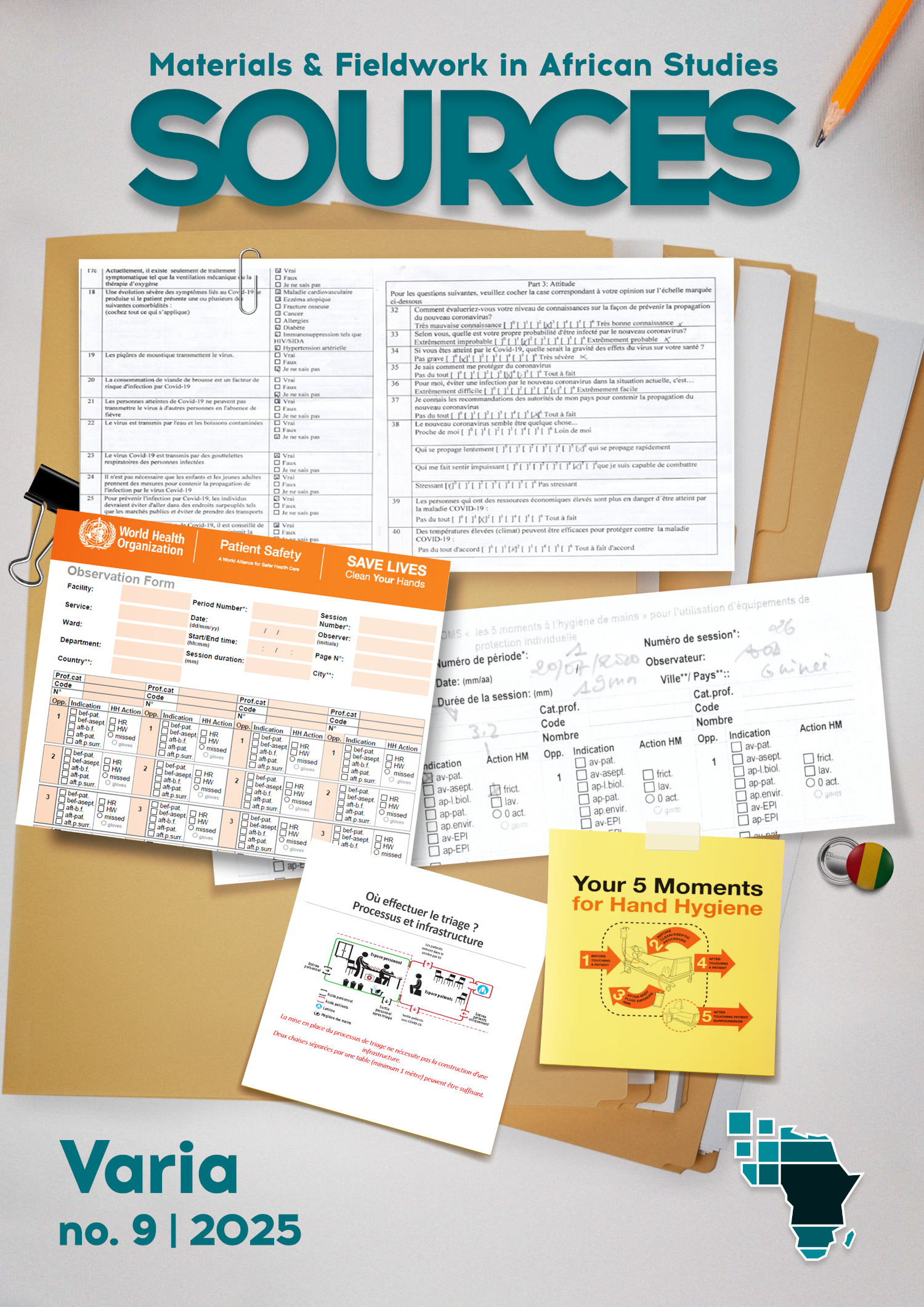Publication - Sources no. 9 "Varia"
 The newest issue of Sources is out! Enjoy free access to this interdisciplinary, multilingual, open-access peer-reviewed journal.
The newest issue of Sources is out! Enjoy free access to this interdisciplinary, multilingual, open-access peer-reviewed journal.
This ninth volume titled “Varia” invites us to follow empirical approaches and the collection of material leading to original research on African societies.
Scroll below for more details
(French below)
Sources Volume 9 “Varia”
Carlos Rocha and Hama Thieni describe immersion surveys carried out in places that are not usually very accessible: a Guinean hospital and the juvenile section of the Ouagadougou prison and correctional facility, respectively. Combining questionnaires, interviews, observations and reflections on their participation in institutional arrangements, these two articles echo each other while presenting contrasting material. Oumarou Hamani goes behind the scenes of ethnographic surveys carried out in the so-called “three borders” zone, a cross-border area between Burkina Faso, Mali and Niger that is currently the epicentre of intense armed violence, forcing local research teams to renegotiate their access to the field. The articles by Felix Oludare Ajiola, Gabriel André and Vincent Foucher examine the making of collective historiographies. Ajiola looks back at his collection of oral and written sources, which enabled him to rigorously reexamine the founding mythologies of two Yorúbà sub-groups, the Idanre and the Ondo, in south-western Nigeria. André and Foucher take a close look at a speech made in 2023 by Aboubacar Sidi Camara, Guinea's Minister of Defence and a retired general. The authors reveal the speech’s underlying references and deliberate silences, and show how this kind of historiography, described as “vernacular,” can contribute to an ethnicisation of politics with concrete social consequences.
Sources Volume 9 “Varia”
Carlos Rocha et Hama Thieni retracent des enquêtes en immersion effectuées dans des lieux habituellement peu accessibles : respectivement un hôpital guinéen et le quartier pour mineurs de la Maison d’arrêt et de correction de Ouagadougou. Combinant questionnaires, entretiens, observations, et réflexion sur leur participation aux dispositifs institutionnels, ces deux articles se font écho tout en présentant des matériaux contrastés. Oumarou Hamani ouvre les coulisses d’enquêtes ethnographiques menées dans la zone dite des « trois frontières », espace transfrontalier entre Burkina Faso, Mali et Niger, aujourd’hui l’épicentre de violences intenses, qui obligent les équipes de recherche locales à renégocier leurs accès au terrain. Les articles de Felix Oludare Ajiola et de Gabriel André et Vincent Foucher interrogent la fabrique des historiographies collectives. Ajiola revient sur sa récolte de sources orales et écrites qui lui permettent de rediscuter avec rigueur les mythologies fondatrices de deux sous-groupes Yorúbà, les Idanre et les Ondo, au sud-ouest du Nigéria. André et Foucher analysent de près un discours prononcé en 2023 par Aboubacar Sidi Camara, ministre guinéen de la Défense et général à la retraite. Les auteurs en dévoilent les références sous-jacentes et les non-dits, et démontrent comment ce genre d’historiographie qualifiée de « vernaculaire » peut participer d’une ethnicisation du politique aux conséquences sociales réelles.
About Sources : The journal, created in 2020 and supported by the French Institutes for Research in Sub-Saharan Africa and Les Afriques dans le monde, aims to publish scientific articles accompanied by the materials that form the basis of their theoretical production, whether derived from archival work or fieldwork, and of all kinds (published or unpublished texts, images, sounds, field notes, etc.), thus constituting reusable research data on the African continent.

Social Media
Mailing List